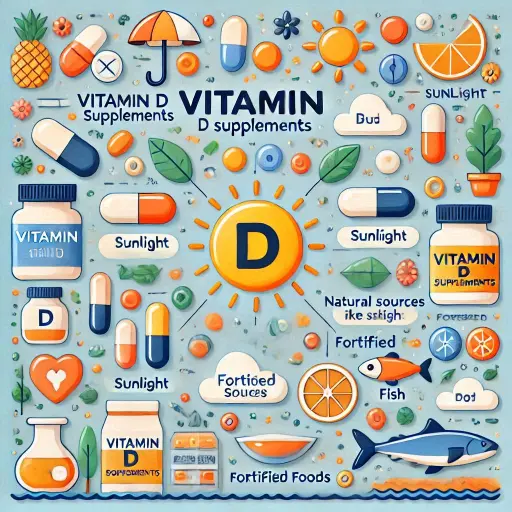Introduction
Vitamin D is often hailed as a wonder vitamin, essential for bone health and immune function. However, there’s more to Vitamin D supplements than just popping a pill and there are dangers of Vitamin D supplements. Let us have a look on the lesser-known dangers of Vitamin D supplementation in his insightful video.
The Importance of Vitamin D
Vitamin D plays a crucial role in various bodily functions:
- Bone Health: It helps in the absorption of calcium, maintaining strong bones and preventing conditions like osteoporosis.
- Immune Function: It supports the immune system, helping to fend off illnesses and infections.
- Mood Regulation: It has been linked to mood improvement and the prevention of depression.
- Muscle Function: Vitamin D is essential for muscle function and strength.
- Cardiovascular Health: It plays a role in maintaining heart health and regulating blood pressure.
The Dangers of Over-Supplementation
While Vitamin D is vital, over-supplementation can lead to serious health issues. Dr. Ekberg highlights several potential dangers:
- Hypercalcemia: Excessive Vitamin D can cause high levels of calcium in the blood, leading to nausea, vomiting, weakness, and kidney problems. Hypercalcemia can also cause confusion, disorientation, and heart arrhythmias.
- Kidney Stones: High calcium levels can result in the formation of kidney stones, which can be extremely painful and may require medical intervention.
- Heart Issues: Over-supplementation may lead to cardiovascular problems, including an increased risk of heart attack and stroke.
- Bone Pain and Fragility: Paradoxically, too much Vitamin D can lead to bone pain and increased risk of fractures.
- Digestive Issues: Excessive Vitamin D can cause digestive problems, including constipation, diarrhea, and stomach pain.
How to Safely Supplement Vitamin D
Let us see the importance of a balanced approach to Vitamin D supplementation. Here are some key points to consider:
- Getting Tested: Before starting any supplement, get your Vitamin D levels tested. This will help determine if you need supplementation and the appropriate dosage.
- Balanced Diet: Incorporate Vitamin D-rich foods like fatty fish (salmon, mackerel, sardines), egg yolks, and fortified foods (milk, orange juice, cereals) into your diet.
- Sun Exposure: Spend time in the sun, as it is a natural source of Vitamin D. Aim for about 10-30 minutes of midday sun exposure several times a week, depending on your skin type and location.
- Monitor Your Levels: Regularly monitor your Vitamin D levels to ensure they remain within a healthy range. Adjust your supplementation as needed based on your test results.
- Consult a Healthcare Professional: Always consult with a healthcare professional before starting any new supplement regimen. They can provide personalized advice based on your health status and needs.
The Role of Vitamin D in Disease Prevention
Vitamin D has been linked to the prevention of various diseases and conditions:
- Osteoporosis and Bone Fractures: Adequate Vitamin D levels help maintain bone density and reduce the risk of fractures.
- Autoimmune Diseases: Vitamin D may play a role in reducing the risk of autoimmune diseases such as multiple sclerosis and rheumatoid arthritis.
- Cancer: Some studies suggest that Vitamin D may help reduce the risk of certain cancers, including breast, prostate, and colon cancer.
- Diabetes: Vitamin D may improve insulin sensitivity and reduce the risk of type 2 diabetes.
- Cardiovascular Disease: Adequate Vitamin D levels are associated with a lower risk of cardiovascular diseases, including heart attack and stroke.
Conclusion
Vitamin D is essential for overall health, but like any supplement, it should be taken with caution. Over-supplementation can lead to serious health issues, so it’s important to get your levels tested and consult with a healthcare professional before starting any new supplement regimen. By maintaining a balanced diet, getting regular sun exposure, and monitoring your Vitamin D levels, you can safely enjoy the benefits of this vital nutrient.

Leave a Reply